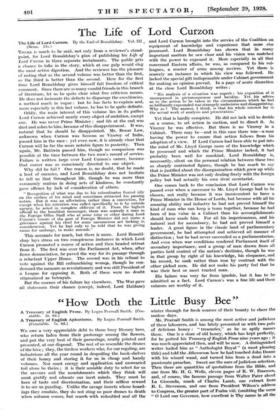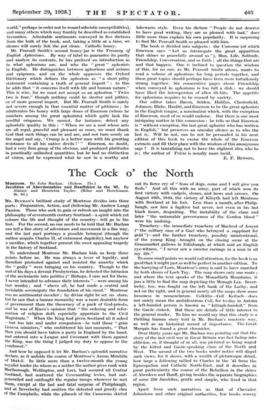" How Doth the Little Busy Bee"
A Treasury of English Prose. By Logan Pearsall Smith. (Con. stable. 38. 6d.)
A Treasury of English Aphorisms. By Logan Pearsall Smith. (Constable. 7s. 6d.) WE owe a very appreciable debt to those busy literary bees, who return laden from their pasturage among the flowers, and put the very best of their garnerings, neatly printed and presented, at our disposal. The rest of us resemble the drones of the hive ; they, the tireless workers who, for our regaling, are industrious all the year round in despoiling the book-shelves of their honey and storing it for us in cheap and handy volumes. Nor must energy and application and unwearied toil alone be theirs ; it is their amiable duty to select for us the savours and the nourishments which they think will most gratify and educate our inert minds. They must be bees of taste and discrimination, and their selfless reward is to see us guzzling. Unlike the savage insects whose hoard- ings they emulate, they do not sting us poor drones to death when autumn comes, but search with redoubled zeal all the winter through for fresh sources of their bounty to cheer the sunless days.
Mr. Pearsall Smith is among the most active and judicious of these labourers, and has lately presented us with two pots of delicious honey : " treasuries," as he so aptly names them. One is a store of old honey, which has kept perfectly, for he potted his Treasury of English Prose nine years ago ; it was much appreciated then, and will be now. A distinguished writer hailed him as " Anthologist Royal " (a most pleasing title) and told the Athenaeum how he had touched John Donne with his wizard wand, and turned him from a dead into a passionate preacher. Sweet are the uses of judicious selection. Then there are quantities of quotations from the Bible, and one from Mr. H. G. Wells, eleven pages of R. W. Emerson, and, of course, the famous passage from Walter Pater about La Gioconda, much of Charles Lamb, one extract from R. L. Stevenson, and one from President Wilson's address to Congress, the greater part of Psalm viii. (omitting the verse " 0 Lord our Governor, how excellent is Thy name in all the
world," perhaps in order not to wound atheistic susceptibilities), and many others which may frankly be described as established favourites. Admirable sentiments conveyed in five diction from the bulk of the book, and, taking a little at a time, we drones will surely lick the pot clean. Catholic honey.
Mr. Pearsall Smith's second honey-jar is the Treasury of English Aphorisms. By way of label to guarantee its purity and analyse its contents, he has prefixed an introduction as to what aphorisms are, and who the " great " aphorists in English. He distinguishes between aphorisms and axioms and epigrams, and on the whole approves the Oxford Dictionary which defines the aphorism as " a short pithy statement containing a truth of general import " ; to this he adds that " it concerns itself with life and human nature." This is wise, for we must not accept as an aphorism " Twice two is four," though nothing could be shorter and pithier, or of more general import. But Mr. Pearsall Smith is surely not severe enough in that essential matter of pithiness ; he adulterates his honey with large doses of Emerson (whom he numbers among the great aphorists) which quite lack the needful crispness. We cannot, for instance, detect any aphoristic quality in this : " When we see a soul whose acts are all regal, graceful and pleasant as roses, we must thank God that such things can be and are, and not turn sourly on the angel and say, Crump is a better man with his grunting resistance to all his native devils ! ' " Emerson, no doubt, had a very firm grasp of the obvious, and produced platitudes in practically unlimited quantities, but he had no distinction of vision, and he expressed what he saw in a worthy and
lukewarm style. Even his dictum " People do not deserve to have good writing, they are so pleased with bad," does little more than explain his own popularity. It is surprising to find Mr. Pearsall Smith so pleased with him.
The book is divided into subjects : the Universe (of which Emerson says " Let us interrogate the great apparition that shines so peacefully around us "), Man, Life, Solitude, Friendship, Conversation, and so forth ; all the things that are and that happen. One is inclined to question the wisdom of this, for no one, as Mr. Pearsall Smith allows, wants to read a volume of aphorisms for long periods together, and these great topics should perhaps have been more fortuitously strung together. Six consecutive pages about Friendship when conveyed in aphorisms is too full a dish : we should have liked the interspersion of alien tit-bits. The appetite for aphorisms requires to be coaxed by variety.
Our editor takes Bacon, Selden, Halifax, Chesterfield, Johnson, Blake, Hazlitt, and Emerson to be the great aphorists in the English tongue, a nomination which, with the exception of Emerson, most of us would endorse. But there is one most intriguing matter in this connexion : he tells us that Emerson is " without exception, the last great aphorist who has written in English," but preserves an oracular silence as to who the last is. Will he not, can he not be persuaded in his next edition of this book to excise the whole of the Emerson extracts and fill their place with the wisdom of this anonymous sage ? It is tantalizing not to have the slightest idea who he is ; the author of Trivia is usually more lucid.
E. F. BENSON.





































 Previous page
Previous page